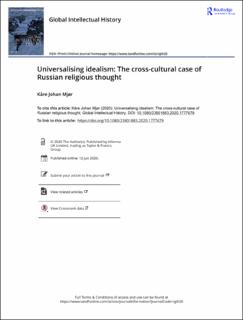Universalising idealism: The cross-cultural case of Russian religious thought
Peer reviewed, Journal article
Published version

Åpne
Permanent lenke
https://hdl.handle.net/11250/2658203Utgivelsesdato
2020Metadata
Vis full innførselSamlinger
- Biblioteket [34]
- Import fra CRIStin [3604]
Originalversjon
Mjør, K. J. (2020). Universalising idealism: The cross-cultural case of Russian religious thought. Global Intellectual History, 1-18. https://doi.org/10.1080/23801883.2020.1777679Sammendrag
The article analyses the idealist dimension of late nineteenth- and early twentieth-century Russian religious thought as it appears in key works by Vladimir Solov’ev (1853–1900), Sergei Bulgakov (1871–1944) and Nikolai Berdiaev (1874–1948). Under the impact of Schelling in particular, these thinkers took religious experience and human consciousness as a starting point for their projects. On the one hand, the article shows that this had a very significant impact also on the way in which they approached classical religious themes. More specifically, it examines how the transmission of idealist philosophy from Western Europe to Russia led to a reinterpretation in the works of these thinkers of certain themes of the Orthodox heritage as well as everyday cultural practices. On the other hand, it points to significant parallels between Russian religious idealism and idealist theology in the West, most notably Paul Tillich. Thus, the transfer of ideas from its Schellingian origin to Russia becomes, the article claims, an example of universalisation, in this case of Shellingian idealism, through the active use and application of ideas and concepts in new contexts.
